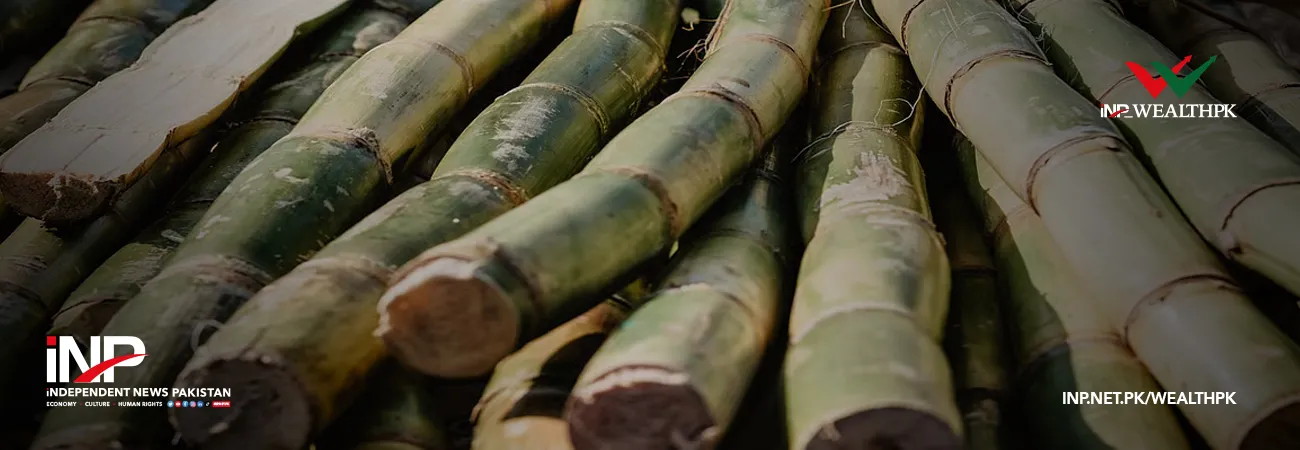INP-WealthPk
By Samia Khalid
ISLAMABAD, Nov 04 (INP-WealthPK): Green financing is a novel concept for environmental sustainability that encourages ecologically friendly long-term growth while reducing carbon emissions.
Green finance is critical as it promotes the flow of financial instruments and related services to support the implementation of sustainable business models, investments, trade, economic, environmental, and social initiatives.
 At present, the United States, France, China, and the United Kingdom are leading the way in green finance lining up trillions of dollars. China's policymakers particularly are at the forefront of establishing a green financial system after the guidelines for green banking policy innovation in 2016.
Chinese banks have enormous potential to contribute to decarbonization at the domestic and international levels. Because China’s ‘Big Four’ state-owned banks are among the world's greatest suppliers of both green and fossil fuel funding. They are the world's four largest banks, with combined assets of $14.8 trillion, more than the US's eleven largest banks (Source: Climate Policy Initiative).
Accelerating China's green banking transformation would be hugely beneficial because Chinese banks are employing green instruments such as specialized tools, techniques, asset-backed securities, and international green credit lines in a variety of ways.
China is working towards its objective of building an ecological civilization and is leading the way in terms of global banking practices toward net-zero emission norms.
China has implemented several measures and changes targeted at greening its financial system to encourage investment in this area as part of its plan. To accelerate the country's investment in sustainable infrastructure for energy, land use, and urban growth, China has implemented several major changes, including the promotion of green credit, green development funds, and a green bond market.
Similarly, the banking industry in Pakistan can also play a crucial role in this journey. It is the elixir that will allow Pakistan's green industrialization and urbanization to flourish and prosper.
Unfortunately, some obstacles to green banking adoption exist, including a lack of knowledge among relevant stakeholders and a paucity of green banking educators or specialists who can advise the banking industry.
The State Bank of Pakistan (SBP) issued green banking guidelines in 2017 as a set of optional measures for banks and development finance organizations (DFIs). As part of the Green Banking standards, SBP has advised banks to open green banking branches.
At this stage, SBP should require that green banking be implemented through the creation of a full-fledged green banking department staffed by dedicated personnel who are knowledgeable in the sector.
The majority of Pakistani banks currently have large environment-friendly financing portfolios, but there is no legal structure in place to make them public under the green banking umbrella. They don't know how to incorporate green finance into their existing portfolios of environmentally friendly funding. Both politicians and the financial industry must adopt and implement this concept for Pakistan to create a sustainable economic structure.
Other Asian countries, especially Pakistan, can learn from China's experience in green financing. Since the green banking policy in Pakistan was implemented in late 2017 and banks are still in the early stages of implementation, regulators must hold training sessions for both banking professionals and borrowers to raise understanding of the terms and circumstances of this type of financing.
In addition, SBP should keep a close eye on the green finance industry and assist financial institutions in developing more incentives to support this sort of financing.
Through a public-private partnership, government policies should be based on the synergistic and simultaneous accomplishment of economic and environmental sustainability. If the government combines its different developmental programs, such as China Pakistan Economic Corridor (CPEC) projects, or E-vehicles, with green banking, it may boost both economic and environmental sustainability at the same time.
Pakistan should develop a framework that allows businesses to raise cash by issuing green bonds to financial institutions. The Securities and Exchange Commission of Pakistan (SECP) should also establish a system for the issuance of green initial public offerings (IPOs) for onward trading on the Pakistan Stock Exchange to accomplish the intended goals of green financing (PSX).
These projects will not only help address the country's environmental concerns, but also give a chance to generate cash through the green finance system. Pakistan may engage the Chinese government and experts to develop a framework for launching green bonds and IPOs to design these initiatives. SECP and PSX should be mandated to organize workshops for a better knowledge of green finance as part of the financial literacy program.
Many of the key features of Chinese green policies should be incorporated into Pakistan's green finance mechanism, such as the issuance of green bonds and initial public offerings (IPOs), which will help green companies raise funds and complete projects that consider the environmental impact of their actions.
At present, the United States, France, China, and the United Kingdom are leading the way in green finance lining up trillions of dollars. China's policymakers particularly are at the forefront of establishing a green financial system after the guidelines for green banking policy innovation in 2016.
Chinese banks have enormous potential to contribute to decarbonization at the domestic and international levels. Because China’s ‘Big Four’ state-owned banks are among the world's greatest suppliers of both green and fossil fuel funding. They are the world's four largest banks, with combined assets of $14.8 trillion, more than the US's eleven largest banks (Source: Climate Policy Initiative).
Accelerating China's green banking transformation would be hugely beneficial because Chinese banks are employing green instruments such as specialized tools, techniques, asset-backed securities, and international green credit lines in a variety of ways.
China is working towards its objective of building an ecological civilization and is leading the way in terms of global banking practices toward net-zero emission norms.
China has implemented several measures and changes targeted at greening its financial system to encourage investment in this area as part of its plan. To accelerate the country's investment in sustainable infrastructure for energy, land use, and urban growth, China has implemented several major changes, including the promotion of green credit, green development funds, and a green bond market.
Similarly, the banking industry in Pakistan can also play a crucial role in this journey. It is the elixir that will allow Pakistan's green industrialization and urbanization to flourish and prosper.
Unfortunately, some obstacles to green banking adoption exist, including a lack of knowledge among relevant stakeholders and a paucity of green banking educators or specialists who can advise the banking industry.
The State Bank of Pakistan (SBP) issued green banking guidelines in 2017 as a set of optional measures for banks and development finance organizations (DFIs). As part of the Green Banking standards, SBP has advised banks to open green banking branches.
At this stage, SBP should require that green banking be implemented through the creation of a full-fledged green banking department staffed by dedicated personnel who are knowledgeable in the sector.
The majority of Pakistani banks currently have large environment-friendly financing portfolios, but there is no legal structure in place to make them public under the green banking umbrella. They don't know how to incorporate green finance into their existing portfolios of environmentally friendly funding. Both politicians and the financial industry must adopt and implement this concept for Pakistan to create a sustainable economic structure.
Other Asian countries, especially Pakistan, can learn from China's experience in green financing. Since the green banking policy in Pakistan was implemented in late 2017 and banks are still in the early stages of implementation, regulators must hold training sessions for both banking professionals and borrowers to raise understanding of the terms and circumstances of this type of financing.
In addition, SBP should keep a close eye on the green finance industry and assist financial institutions in developing more incentives to support this sort of financing.
Through a public-private partnership, government policies should be based on the synergistic and simultaneous accomplishment of economic and environmental sustainability. If the government combines its different developmental programs, such as China Pakistan Economic Corridor (CPEC) projects, or E-vehicles, with green banking, it may boost both economic and environmental sustainability at the same time.
Pakistan should develop a framework that allows businesses to raise cash by issuing green bonds to financial institutions. The Securities and Exchange Commission of Pakistan (SECP) should also establish a system for the issuance of green initial public offerings (IPOs) for onward trading on the Pakistan Stock Exchange to accomplish the intended goals of green financing (PSX).
These projects will not only help address the country's environmental concerns, but also give a chance to generate cash through the green finance system. Pakistan may engage the Chinese government and experts to develop a framework for launching green bonds and IPOs to design these initiatives. SECP and PSX should be mandated to organize workshops for a better knowledge of green finance as part of the financial literacy program.
Many of the key features of Chinese green policies should be incorporated into Pakistan's green finance mechanism, such as the issuance of green bonds and initial public offerings (IPOs), which will help green companies raise funds and complete projects that consider the environmental impact of their actions.












